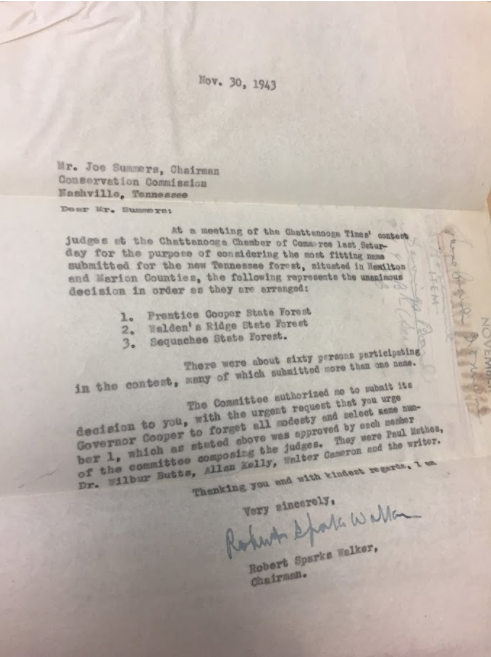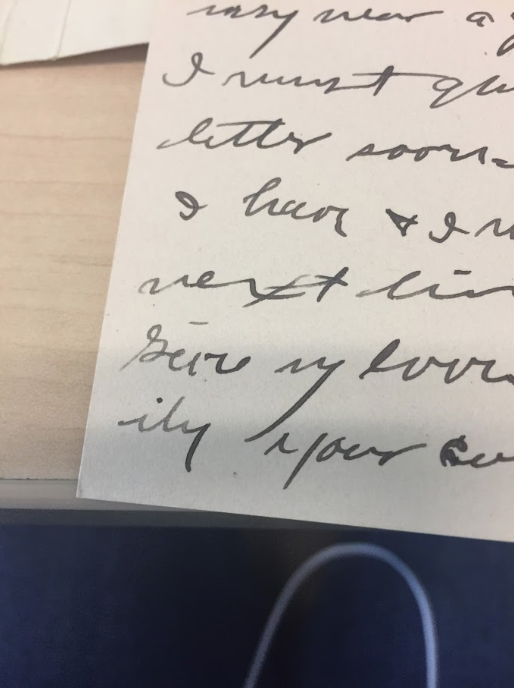This blog post was authored by Haley McCullough, an intern in the Library’s Special Collections unit from the UTC Department of English in Fall 2018.
While looking at options for my Senior Capstone project, I wanted something that would push me out of my comfort. Yes, I could have taken a seminar class and analyzed assigned readings. However, I didn’t want something normal. I actually sought out this internship position a little earlier than was allowed and I had to wait until this semester to be able to apply. This internship has been the highlight of my senior year. My intent for this internship in Special Collections was to gain academic experience in a hands-on approach and explore a potential career in the library system. Before beginning on this journey, I was not really expecting anything because I was not exactly sure what I was getting myself into. I just knew that an internship position in Special Collections would be a life-changing experience… and it truly has been such. I’ve always said that if I hadn’t been an English major, I would have gone into History. So, this internship is the culmination of both my loves in life. At first, I was not sure how my academic strengths could be used in such an environment. However, I was determined to succeed. I decided that the best use of my strong writing skills would be to create an exhibit on a particular aspect of Chattanooga history.
I focused my project on an unsung Chattanooga legend, Robert Sparks Walker. He was a naturalist and a well-known writer who lived from 1878 to 1960. After graduating with a law degree from Grant University (now UTC!), he followed his heart and began writing nature articles and poems by the thousands. He published several poetry anthologies and books, his most famous being Torchlights to the Cherokees: The Brainerd Mission, which earned him a nomination for the Pulitzer Prize for History in 1931 and he became a well-known authority on plant identification and ornithology (the study of birds). His most lasting work is not in writing, though. Robert Sparks Walker founded the Chattanooga Audubon Society and transformed his childhood farm into the Elise Chapin Wildlife Sanctuary, now known as Audubon Acres, which is still open to the public to this day! The most incredible thing in all this is that Robert Sparks Walker was able to spend his entire life combining the two things he loved most: writing and nature. So, I began the task of going through the very large collection of letters, articles, manuscripts, pictures, and scrapbooks. A typical day for me looked like this:

Having the privilege to interact with the tangible history of one individual for as long as I did was an amazing experience. It wasn’t easy, though. Being so used to being given some kind of parameters for projects, there were some growing pains in deciding what to do and where to start. I was given almost free-reign over this project and it was up to me to create a narrative that would appeal to the public. I spent a lot of time in the first month of my internship reading all of his personal correspondence, which is not where I needed to be. I was trying to read everything in order and with 106 boxes in the collection, if I had stayed in that track, it would take me years to finish it. I really had to learn to prioritize my time and cut out unrelated or irrelevent information to get to the literary gems hidden between hundreds of pages of rejection letters and advertisement design negotiations. However, I don’t see this as a bad thing! Prioritizing and managing my time are great skills that I can use for the rest of my life and it was good to figure it out here. Regardless of the growing pains, I loved every minute of this experience! I learned so many things about my hometown that I’d never even heard of before. For example, I discovered that Prentice Cooper State Forest, which is less than 20 miles from campus, was named in a contest in Walker’s newspaper column.

I also learned that people were just as lazy about writing almost 100 years ago as they are today. I found the now-common abbreviation of the phrase “I love you” in a letter from 1896.

Almost 50 years after his passing, there are 106 boxes filled with the culmination of his life’s work. This project has shown me how much one can live on through one’s writing. I could truly see his life unfold before me with every box that I opened. I could see the grief in his writing when he told others of the tragic and horrifying death of his child, Robert Sparks Walker, Jr., at the age of eight. I could feel his joy when he spoke of his granddaughter, Madeline Alexandra Walker, and their adventures in the city. With the thick strokes and indentations in the paper from his pen, I could experience his passionate reaction to the bombings at Pearl Harbor on December 7th, 1941. His experiences live on through what he left in this material world and his collection caused me to assess my material legacy. Amazing how someone who has been dead for almost 50 years can wreck my life as hard has he did. I was able to use my writing and analytical skills to show the messages that Robert Sparks Walker was trying to send to his audience. These messages of humility and reverence for every living thing, either flora or fauna, are universal and transcend the decades to remain relevant today.
The beauty of being an English major is that I have years of experience critically analyzing texts for their literary merit. So, since I was dealing with an author’s material legacy, I decided to take a slightly different approach from most library exhibits. Instead of just showcasing some of the pieces in the collection that I felt best exemplified Robert Sparks Walker, I chose to select a few examples of his poetry and prose and use those honed critical analysis skills of mine to bring to light some important and relevant lessons that we in this generation can apply to our normal lives. My coursework in literature and analysis gave me the ability to execute this exhibit with precision and discretion.
Oddly, the one thing that I will miss the most about Special Collections is the smell of the Archives room. I know that sounds odd, but it smells like concentrated old books (because there are a lot of them in there), which gives me a sense of calm and nostalgia because I’ve spent a good portion of my life in libraries. I’m not sure what that says about me, but it’s true. This internship afforded me the opportunity to explore my future career in a small way, but it has lit the fuse of passion for the industry. I will never forget my internship with UTC Special Collections and I will be able to transfer the skills I’ve learned here in my future endeavors, no matter where they take me in life!